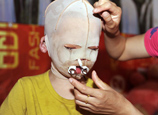
 |
| A man undergoes an HIV test at an HIV quick-testing center in Panjiayuan, Chaoyang district Monday. The center is sponsored by NGO Chaoyang Chinese AIDS Volunteer Organization. Photo: Li Hao/GT |
Residents of South China's Guangxi Zhuang Autonomous Region will be required to provide their real name when taking an HIV/AIDS test from July 1, according to a new local government ruling.
The new rule may prevent people from coming forward to be tested, Meng Lin, coordinator of the China Alliance of People Living with HIV/AIDS, told the Global Times Sunday.
The new rule was passed Thursday, according to a press briefing from the region's Standing Committee of the People's Congress Friday.
It requires that all HIV tests should be carried out on a real-name basis, with those who test positive obliged to inform their spouses or sex partners, People's Daily Online reported.
The proposal has been controversial since the draft law was first made public in January 2012. While many people were in favor of the move, others argued that it would lead to a loss of people's privacy.
In order to protect the test takers' privacy, the testing institution must keep the test takers' information private. The institution is forbidden from releasing this information without permission from the test takers or their family, according to the regulation.
The real-name testing is needed, as since AIDS spread to Guangxi in 1996, it has become a main area for AIDS cases in China, said Fan Xiaohui, a senior official from the Standing Committee of the Guangxi People's Congress, the press release said.
This real-name system is intended to allow healthcare professionals to keep in contact with HIV carriers and help them prevent their spouse or sex partners from being infected.
"This is the first region that demands HIV testing with real names via legislation, although the move has sparked a long-term debate since it was first drafted," said Meng.
The Chinese Center for Disease Control and Prevention has previously advocated that people should submit their real-name when receiving an HIV test, stating that the tests will be beneficial for the prevention and treatment of HIV/AIDS.
Many of those living with HIV or AIDS and some NGOs working on AIDS prevention opposed the proposal, arguing it might scare off test takers and even result in a further spread of the disease, as discrimination against HIV carriers in China is a major social issue.
Some people, particularly those from the HIV-positive community, fear that a real-name registry might create privacy issues.
"According to an investigation done by the Renmin University of China, privacy is essential for HIV carriers, many of whom would prefer not to get tested if this issue is not solved properly," Meng said.
"Some of the developed countries that support HIV real-name testing protect the privacy of test takers' carefully under laws, which are strict in terms of people's human rights. People can't be tested unless they willingly agree and are aware of what the test may conclude," he noted.
















 Photo story: Mask girl's hard life
Photo story: Mask girl's hard life


![]()
